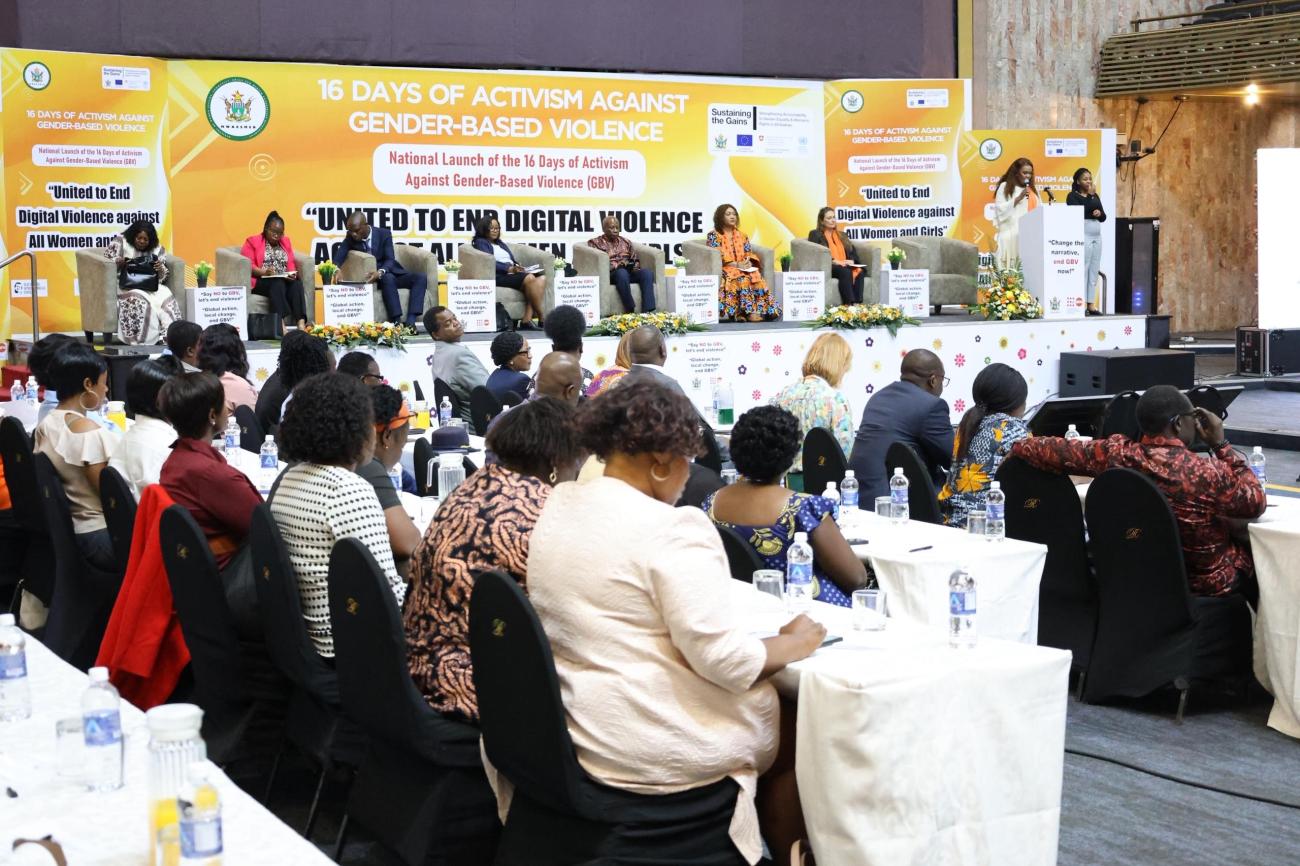Turning the Tide, Zimbabwe’s Push to End Gender-Based Violence in a Digital Age

Speakers placed Technology-Facilitated Gender-Based Violence at the center of national concern.
24 November 2025, Harare — Urgency and determination marked the national Gender Based Violence Symposium and the launch of the 16 Days of Activism against Gender-Based Violence (GBV) on 22 November at the Harare International Conference Centre.
Government leaders, diplomats, UN representatives, development partners, civil society, traditional and religious leaders, and survivors convened at the National Gender Based Violence Symposium to assess progress, confront emerging threats and map a coordinated path forward — with particular focus on the digital sphere.
Framed by the rallying call “UNite to end digital violence against all women and girls,” the symposium opened with a recorded keynote by His Excellency Dr. Emmerson D. Mnangagwa, President of the Republic of Zimbabwe. The President acknowledged gains while stressing unfinished work, “We are determined to realize an environment that is just and free of Gender Based-Violence for women, men, girls and boys… the High-Level Political Compact, policies and frameworks to end gender-based violence and protect women’s rights are all aligned to our National Development Strategies towards Vision 2030.” He highlighted legal and policy advances, including the National GBV Response and Prevention Strategy (2023–2030) and efforts to mainstream gender across government, but conceded that “much more needs to be done.”
Speakers placed Technology-Facilitated Gender-Based Violence (TFGBV) at the center of national concern. Mr. Edward Kallon, UN Resident and Humanitarian Coordinator, described digital violence as “real violence,” noting harms that reverberate offline — mental health impacts, economic exclusion, silencing of journalists and political actors, and erosion of civic participation.
Recent data underline the scale and character of the problem. A 2025 UNESCO/MISA report found 63% of women journalists in Zimbabwe had experienced TFGBV. A national survey by Emthonjei Women’s Forum reported 75% of respondents had faced digital abuse in the past year, with more than half of perpetrators strangers and platforms like Facebook and X commonly cited. Patterns vary by age: children and adolescents face grooming, child sexual abuse material and technology-enabled child marriage; adolescent girls encounter harassment that affects schooling and social life; adult women endure workplace harassment and intimate-partner digital abuse; older women are vulnerable to financial and caregiving-related exploitation.
Policy progress, including laws, strategy and institutions Zimbabwe’s policy environment has made meaningful advances. The Cyber and Data Protection Act criminalizes forms of TFGBV — online harassment, image-based abuse and cyberbullying — and provides measures for investigation and handling digital evidence. The National Strategy to Prevent and Address GBV (2023–2030) explicitly recognizes TFGBV as an emerging issue, and the government has established a High-Level Political Compact (HLPC) to coordinate GBV efforts across sectors.
At the launch, Deputy Minister Jennifer Mhlanga framed GBV as both a human-rights and an economic crisis, citing a government-commissioned economic costing study — conducted with the World Bank, UNFPA and NYU— whose preliminary findings underscore how the economic cost of GBV, 3.87% of the GDP, has a significant impact on the national economy. It drains household incomes, reduces labour productivity, increases health and social service costs and impedes national development — making investment in prevention and response a fiscal as well as moral imperative.
Despite progress, persistent gaps were highlighted:
- Underreporting and weak data systems has made GBV, including TFGBV, remains poorly measured in many national surveys. ZIMSTATS is introducing a TFGBV module, but data collection, analysis and use must be expanded.
- Enforcement and access to justice with existing laws and robust policy frameworks, yet implementation, prosecution and survivor-centred processes are inconsistent across provinces.
- Funding shortfalls requiring for sustained domestic financing are limited; prevention and multi-sectoral response services remain donor dependent.
- The need for an accountability platform and digital literacy. Private technology platforms often lack locally appropriate redress and moderation; digital safety education is insufficiently scaled.
-
Addressing social norms and harmful practices in line with legal and policy frameworks. Deep-rooted gender norms continue to enable violence and limit women’s leadership and economic opportunities, requiring consistent alignment of norms and legal frameworks.
Financing, innovations and partnerships Speakers urged diversified financing. Under the EU and SDC funded UN Joint programme ‘Sustaining the Gains’, the UN and partners committed to build on the economic cost study to build a comprehensive GBV Investment Case including financing models.The symposium spotlighted private-sector and civil-society efforts, including the ‘We Are One Fund’ led by the Sivio Institute to mobilize Zimbabwean-led resources for survivors and community-led responses.
Frontline workers and survivors’ advocates stressed gaps in evidence collection and the emotional toll of support work, underscoring the need for training in digital evidence handling and survivor-centred care.
What’s working:
- Multisectoral coordination under the National GBV Response and Prevention Strategy is improving referral pathways between health, justice, social services and shelters in some provinces.
- Legal reform, including the Cyber and Data Protection Act and other GBV-related statutes, provides tools to pursue online abusers.
- Data momentum with ZIMSTATS’ planned TFGBV module and the economic-costing study are important steps toward evidence-based policy advocacy.
- Community engagement with traditional leaders, religious institutions and women’s coalitions increasingly support prevention and survivor reintegration in some areas.
Priority actions going forward Delegates converged on urgent priorities:
- Scale and sustain survivor-centred services (health, psychosocial, legal aid, shelters) with stable domestic financing.
- Strengthen enforcement by capacitating police, prosecutors and the judiciary to handle TFGBV and digital evidence sensitively and effectively.
- Expand data systems for regular GBV measurement and reporting; use economic-costing evidence to advocate for budget allocations.
- Boost platform and private-sector accountability through negotiation mechanisms for faster takedown, data preservation for investigations, and local moderation capacity.
- Mainstream digital safety education into school curricula, workplace codes and community training.
- Invest in prevention by shifting resources upstream to social norms change, community mobilization, and programmes engaging men and boys.
A cautious but resolute outlook Zimbabwe’s GBV response is at a pivotal moment. Legal frameworks, national strategies and political commitment are stronger than in past decades; alignment of GBV action with Vision 2030 signals intent to integrate gender justice into national development. Yet technology-enabled violence exposes vulnerabilities in data, enforcement and resources.
Progress requires sustained political will, sufficient funding, private-sector cooperation, reliable data, and the input of survivors and frontline workers. Stories from UN-supported programs, including one-stop centers, demonstrate how coordinated support helps survivors reclaim safety, seek justice, and rebuild livelihoods — and underscore that complacency is unaffordable: every unresolved case erodes dignity, potential, and national prosperity.
“We must recommit, act, invest and maintain solidarity,” UN Resident Coordinator Edward Kallon urged delegates, calling for solidarity to be translated into laws enforced, budgets allocated and communities transformed.
If Zimbabwe meets this moment with sustained, multi-sectoral action, the 16 Days of Activism can be a catalyst for measurable reductions in violence and a tangible expansion of rights, safety and opportunity for women and girls across the country.
Ms. Lourdes Chamorro, Chargé d’affaires and Deputy Ambassador of the Delegation of the European Union to the Republic of Zimbabwe, reaffirmed the EU’s commitment and detailed its support. “On behalf of the European Union, I am honoured to join you today for this important national commemoration of the 16 Days of Activism Against Gender-Based Violence,” she said, calling the event “a moment to stand together, honour the courage of survivors, and reaffirm our shared commitment to a Zimbabwe and a world free from violence.”
Ms. Chamorro commended Zimbabwe’s constitutional and legislative advances — citing the Domestic Violence Act, the National GBV Strategy and the High-Level Political Compact — and welcomed the President’s declaration of GBV as a national emergency. She emphasized the EU’s own frameworks, including the Istanbul Convention, the EU Gender Equality Strategy and the 2024 Directive on Violence Against Women and Domestic Violence, as instruments advancing prevention, protection and prosecution.
Highlighting Team Europe’s investments, she noted that the EU, its Member States and institutions, joined by Switzerland under the Team Europe Initiative on Gender Equality and Women’s Empowerment, “have collectively committed more than €300M towards advancing gender equality and women’s empowerment between 2021 and 2027.”
She introduced the newly signed Sustaining the Gains programme (October 2025), jointly funded by the EU and Switzerland with a budget of USD 4.5 million, implemented with the Ministry of Women Affairs and four UN agencies. The programme aims to consolidate and scale up Spotlight Initiative gains — from equipping the forensic laboratory at ZRP Headquarters to strengthen evidence collection in rape cases, to supporting the enactment of the Marriages Act, establishing Safe Markets in Epworth and Umzingwane, and expanding national GBV hotlines.
On the economic-costing study, Ms. Chamorro stressed its significance by quantifying the financial burden of violence — “from healthcare and social services to absenteeism, reduced productivity, high staff turnover, and legal costs” — the study moves the conversation beyond moral duty to economic reality. “For policy makers and the private sector alike, the message is clear, the cost of inaction far exceeds the cost of prevention,” she said, underscoring global and regional figures she cited: the World Bank’s estimate of losses up to 3.7% of GDP due to violence against women, and the EU’s annual cost estimate of EUR 289 billion.
Addressing digital threats, Ms. Chamorro affirmed that “digital spaces should expand possibility, not reproduce inequality.” She warned that online harassment, cyberstalking, doxing, non-consensual sharing of intimate content, disinformation and incitement disproportionately affect women and girls, and that online abuse often spills into real-world harm. The EU’s commitment, she said, includes support for accountability mechanisms, helplines, digital literacy and strengthened reporting channels, working in partnership with government, UN agencies and civil society.
Ms. Chamorro called for a broad coalition, “Ending GBV — whether at home, in communities, workplaces, or online — requires all of us. Government, development partners, civil society, the private sector, traditional and community leadership, parents, youth, and individuals, we must all play our part.” She urged safeguarding gains, pushing back against rollbacks in gender equality, prioritizing prevention, protection and justice, and recognizing that advancing women’s rights is “not only morally right — it is smart economics.”
She wished delegates productive discussions and a successful validation of the economic-costing study, while reaffirming the EU’s readiness to continue supporting Zimbabwe’s efforts to end violence against women and girls in all its forms.
"The national launch of the 16 Days of Activism is a critical moment to confront the emerging crisis of digital violence and reinforce the urgency of our national response. The preliminary findings from the economic costing study - which UNFPA was proud to support - is clear: Gender-Based Violence is not only a human rights crisis, but an economic drain that impedes development. We must treat investment in prevention and survivor-centred services as both a moral and fiscal imperative for national development,” said UNFPA Representative Ms. Miranda Tabifor.
As delegates at the Harare symposium emphasized, progress will depend on sustained political will, adequate financing, private-sector cooperation, quality data and the voices of survivors and frontline actors. They also underline why Zimbabwe cannot afford complacency as every unaddressed case is a loss of dignity, potential and national prosperity.
“We must recommit, act, invest and maintain solidarity,” the UN Resident Coordinator Mr. Edward Kallon called on delegates, echoing a wider chorus. Ending GBV in Zimbabwe — online and offline — will require that solidarity translated into laws enforced, budgets allocated and communities transformed.
If Zimbabwe meets this moment with sustained, multi-sectoral action, the 16 Days of Activism will remain more than a calendar event; it will be a catalyst for measurable reductions in violence and a tangible expansion of rights, safety and opportunity for women and girls across the country.
Written by











